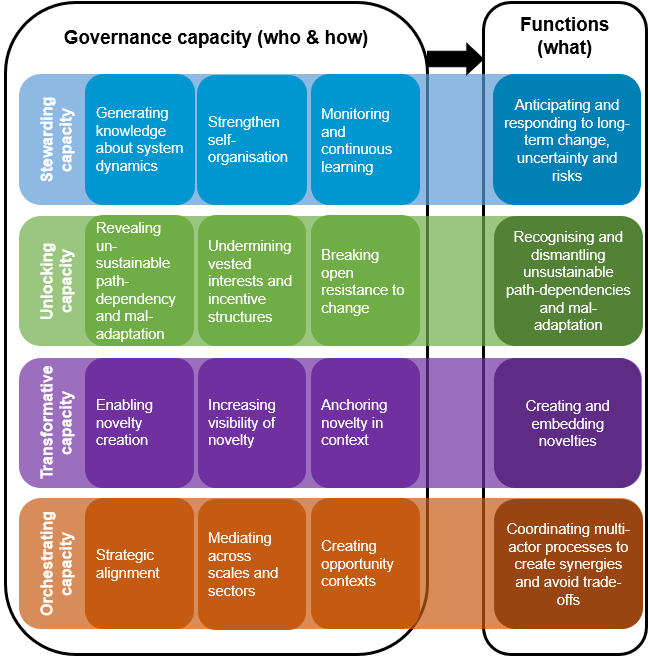(deze publicatie is in het Engels)
As the goal to limit climate change to 1.5 °C is on the brink of becoming impossible, decisive changes in climate governance are needed quickly. A new book by Katharina Hölscher and Niki Frantzeskaki gives a positive vision and structuring approach for climate governance, to shift the narrative from apathy and stalemate to action and transformation.
The state of climate action
2019 was both a hopeful and disappointing year for global climate action. Hopeful, as we saw bottom-up pressures intensifying, spearheaded by Greta Thunberg’s Fridays-For-Future movement, with citizen protests around the globe, almost 1.000 cities worldwide declaring climate emergency, and the European Commission’s Green Deal.
But in that same year, global emissions hit an all-time high and the COP25 meeting in Madrid in December 2019 concluded with disappointing results. The negotiations backslided into a narrative light on ambition, without political agreement for taking the bold and transformative action needed to reach the Paris Agreement.
A positive vision for navigating transformations
We wrote this book to give a positive vision and structuring approach for governance for climate change, to shift the narrative from the apathy and stalemate to action and transformation. Our belief is that in order to effectively address climate change, climate governance itself needs to be transformed. Our vision contrasts existing climate governance and associated lock-ins that signify the institutional resistance to change and become manifest in the inability to substantially reduce emissions and maintain human and environmental wellbeing on this planet.
Specifically, we introduce transformative climate governance as an integrative, learning-based and inclusive governance approach that addresses climate change in synergy with long-term sustainability and resilience goals. In other words: any attempt on climate mitigation and adaptation should be part of the quest for deep societal transformations towards sustainability and resilience.
To this end, our central contribution is a framework of capacities for transformative climate governance. The capacities framework responds to the lack of overarching insights into how diverse governance mechanisms and conditions can be integrated within a theory of governance for transformation under climate change. Starting from the question of ‘what needs to happen’ to facilitate transformative climate governance, the framework allows to systematically investigate the dispersed climate governance landscape as a conglomerate of dynamic and systemic conditions and actor-related processes at multiple levels and in multiple settings (‘how’ and ‘by whom’ this is made to happen).
Capacities for Transformative Climate Governance: A Conceptual Framework
Learning from practice: how to develop transformative climate governance
The book brings together a collection of case studies to investigate how capacities for transformative climate governance are developing at multiple scales and how they can be strengthened. We zoom in on urban climate governance in Rotterdam (the Netherlands) and New York City (USA) to explain and evaluate the role of cities in delivering effective climate action. We also show how the capacities framework can be used for supporting climate action at European, regional and local levels in inter- and transdisciplinary research settings that develops transition pathways in the context of high-end climate and socio-economic scenarios.
Our case studies shed light on the following questions: What are key overarching conditions, actors and activities that facilitate governance for transformation under climate change? Given persistent climate governance lock-ins, what needs to happen in research and policy to build-up the capacities that transform climate governance and ensure effective climate action?
A call for decisive action, now
We conclude the book with a research agenda that signposts promising conditions and activities for building capacities at multiple levels as well as capacity gaps and barriers that persist in (climate) governance. We emphasise that – as the 1.5°C goal is on the brink of becoming impossible – decisive changes in climate governance are needed quickly. The main future challenge we highlight is about formalising the capacities. As discussed by the contributors to this volume, ultimately, investing in the capacities means to change the cultures, types of knowledge and networks that guide decision-making and planning.





